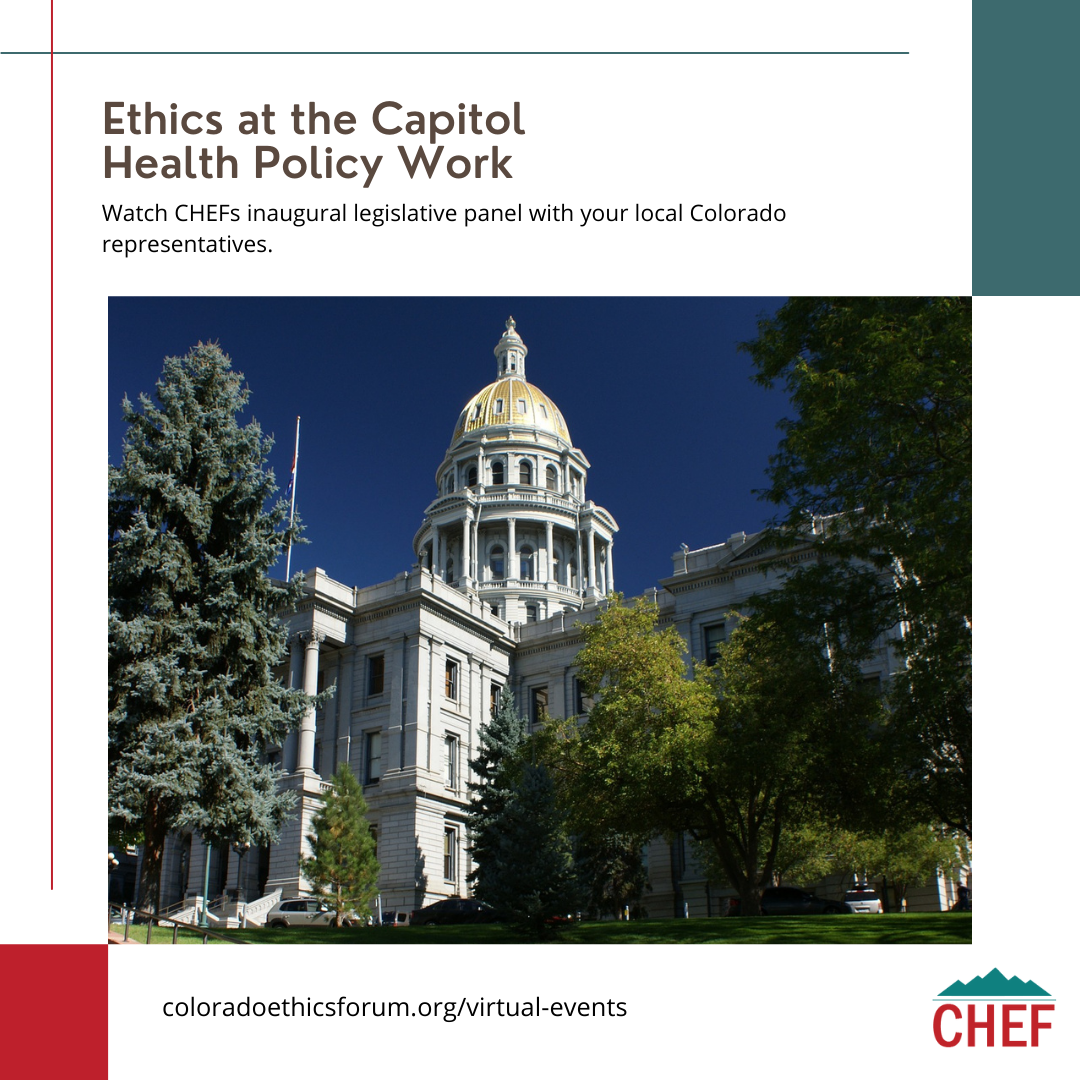2021 Inaugural Legislative Panel
Ethics at the capitol: health policy work
In recent years, Colorado has passed several big health care bills aimed at improving the availability and affordability of health care and advancing health equity. From reducing the cost of prescription drugs and hospital care to improving the quality and cost of health insurance to addressing racial inequities in maternal and infant health, state legislators have taken aim at some of the most persistent problems in health care.
Legislator panelists: Representative Chris Kennedy, Representative Julie McCluskie, and Representative Iman Jodeh
Watch the recording of the presentation recorded November 18th, 2021. Join CHEF moderators Meleah Himber M.Ed and Carl Middleton, DMin, MDiv, MA, MRE.
The Colorado Office of Public Guardianship (OPG) Pilot Program was established in the Fall of 2019 to serve indigent and incapacitated adults. The Colorado OPG has four Public Guardians that are court-appointed to serve as guardian for clients that have no other family or friends to serve them. The Director of the Colorado OPG and a Public Guardian will share information about:
• Eligibility criteria for the Colorado OPG Pilot Program;
• The legal guardianship process for adults;
• Colorado OPG Best Practices and Standards; and
• Continuation and expansion of the Colorado OPG Pilot Program.
Watch the video of this virtual event recorded June 24th, 2021. Join CHEF moderator Kayla Kostelecky, JD, PhD with panelists Sophia M. Alvarez, JD, MS and Camille Price.
While barriers to realizing equitable healthcare in rural communities have been well-documented, the unique challenges to achieving equitable delivery of the COVID-19-vaccine are only beginning to be widely appreciated. This panel offers perspectives from three key entities facilitating rural vaccination efforts: county-level public health, a Federally Qualified Health Center, and a hospital system.
The panelists will discuss their experiences responding to the unique challenges to vaccine delivery and adoption in the rural and frontier settings. In addition to describing barriers to vaccine equity in the rural setting, the panelists will discuss how they are addressing these challenges and navigating some of the ethical dilemmas encountered.
Watch the video of this virtual event recorded April 22nd, 2021. Join CHEF moderators Kayla Kostelecky, JD, PhD and Carl Middleton, DMin, MDiv, MA, MRE with panelists Theresa Trujillo, Robin Johnson, Joel Tanaka and Josh Neff.
Regrettably, encounters between first responders with members of our community with mental health problems have sometimes resulted in injuries, or even fatalities, for the person or persons needing assistance. These unfortunate results may well have occurred in the past because of a lack of preparation and training of first responders in attending to people in mental health crisis and this situation has become a growing concern, often by the first responders themselves. The limits in the 911 system in attending to mental health issues has reinforced inequities in early treatment of vulnerable patients. This presentation highlights three innovations of local Colorado agencies in addressing these inequities, including one model designed and administered through a sheriff’s office, another designed with a paramedic and mental health worker, and the final model through Colorado Crisis Services delivered exclusively by EMS providers in rural Colorado.
Watch the video of this virtual event recorded February 26th, 2021. Join CHEF moderator Dr. Thomas Dunn with panelists Sheriff Jaime FitzSimons, Assistant Chief Justin Harper and James McLaughlin.
Immigrants without legal status in the United States face a number of barriers to healthcare and social services, but those placed in detention centers represent an especially vulnerable subset of this population. Most of them flee crime and persecution in their home countries, only to be detained in prison-like conditions after reaching the US while their immigration claims are processed. Numerous reports have documented the sub-standard conditions in the centers leading to medical neglect, abuse from fellow detainees or guards, health deterioration or premature death from treatable medical conditions, and suicide.
Watch the video of this virtual event recorded November 20, 2020 with Jamie Moo-Young, MD, and Trina Seefeldt, PhD of Denver Health along with Carlos Franco-Parades, MD of CU Anschutz as they explore the health disparities of immigrants detained in the US and what can be done to alleviate them.
Advance Psychiatric Directives: What you Need to Know
CLICK HERE TO WATCH VIDEO
Advance Directives often guide care decisions when an individual is unable to express his/her wishes. While they have been commonplace in healthcare for decades, in 2019 Psychiatric Advance Directives became recognized in Colorado state law. They are designed to provide guidance on decisions, medications and treatments a person wants when in a psychiatric crisis. Such directives differ from Medical Directives in a number of ways and are certain to trigger consultations from ethics teams. The documents are now being made available to clients by providers and patient advocates. Be prepared for the issues that they will raise.
Watch the video of this virtual event recorded September 25, 2020 with Moe Keller, Director of Health Advocacy at Mental Health Colorado along with Lacey Berumen, PhD, Director of Behavioral Sciences for TRACKtech LLC and Jonathan Culwell, Esq.





